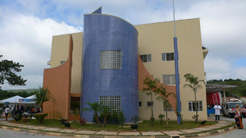Seventh-day Adventists in Brazil are dramatically increasing their public outreach possibilities after acquiring a license to rebroadcast television programming through the so-called High and Low Power rebroadcast stations. A broadcasting agreement, called Geradora, was signed with the Brazilian government on April 20, and grants the church authority to retransmit TV programs throughout the country.
In practical terms, the Geradora license will give the Adventist broadcasting company, SISTEMA, the ability to transmit its programs in an area where more than 2 million potential listeners live. Also, it gives the church the right for rebroadcast programs of its Hope Channel in more than 5,000 cities. According to Williams Costa Jr., the church's communication director in the South American region, this is a step up from the current operation on some 60 Low Power TV stations in Brazil, and these local licenses were operated on the basis of the local city mayors permitting the rebroadcasts.
Costa said the purchase of the Geradora concludes a five-year process, and now establishes these stations under a federal license and permits the church to open stations anywhere frequency allocations and local conditions permit.
"There will be a tsunami wave of new stations installed in thousands of churches across Brazil," he added.
Milton Souza, director of SISTEMA Media Center, called the development an example of the "providence of God."
"The church is making a huge sacrificial commitment to acquire this license. This opens the door for our SISTEMA Media Center productions to have a much wider impact and increase the effectiveness of the It Is Written and Voice of Prophecy broadcasts and our Bible School," he said.
On Sunday, April 23, Pastor Jan Paulsen, president of the world church, joined Pastor Ruy Nagel, president of the church's South American region, and other church officials at the dedication ceremonies in Jacarei. The official opening of a new media facility concluded the next step to position the SISTEMA Media Center, which moved to its new location in Nova Friburgo, near Rio de Janeiro, as the premier communication center for the Adventist Church in South America.
"You are a widely recognized leader in this particular ministry," Paulsen said in his remarks to 500 participants at the SISTEMA inauguration. "Don't be content with what you did yesterday. Push the boundaries. Be creative. Look for new ways to tell the story of Jesus."
"Ours is a message of salvation and peace. But above all, it is a message of hope," Paulsen added. He also paid tribute to the visionary spirit of the Adventist Church in South America, and to contributors who exemplified the vision in this new production facility. He also recognized the joint efforts of all communication professionals who bring the church's message in an attractive and compelling way to the viewers and listeners.
According to Costa, acquiring the license, as well as establishing a new media center near Sao Paulo, was a conclusion of joint efforts by SISTEMA, the South American region of the church, and all local and regional church levels. Also the major church institutions of Brazil, as well as private contributors, such as philanthropist Dr. Milton Afonso, the Souza family, and thousands of church members, have financially supported the media ministry over the years.
A converted warehouse on 80 acres of land now houses several media facilities and has 140 employees. The operation produces TV and radio programming in Portuguese and Spanish and uplinks radio and TV programming as well as productions of Adventist World Radio. Such outreach ministries as It Is Written and the Voice of Prophecy Bible School, as well as the marketing of Novo Tempo [New Times] productions are also a part of the center's activities. The Internet plays a significant role in new outreach approaches of the center.
Observers note that SISTEMA is perhaps the largest and best such production center of the world church. Located 45 miles away from the São Paulo International Airport, it is a showcase of "integrated approach to church communication, and rooted in the witness and mission of the church," said Rajmund Dabrowski, communication leader of the Adventist world church. This media center is an "expression of convergence of technologies ... and is a crossroad where Adventist outreach productions intersect and are integrated."
The radio and TV channels, which broadcast from Brazil, are called Novo Tempo - Hope Channel [New Times - A Channel of Hope]. "The name connects these productions to give it an integrated approach to broadcast ministry in South America. This is a significant accomplishment for the world church," said Brad Thorp, director of Adventist Television Network, who joined the Brazilian officials at the Geradora license signing.

